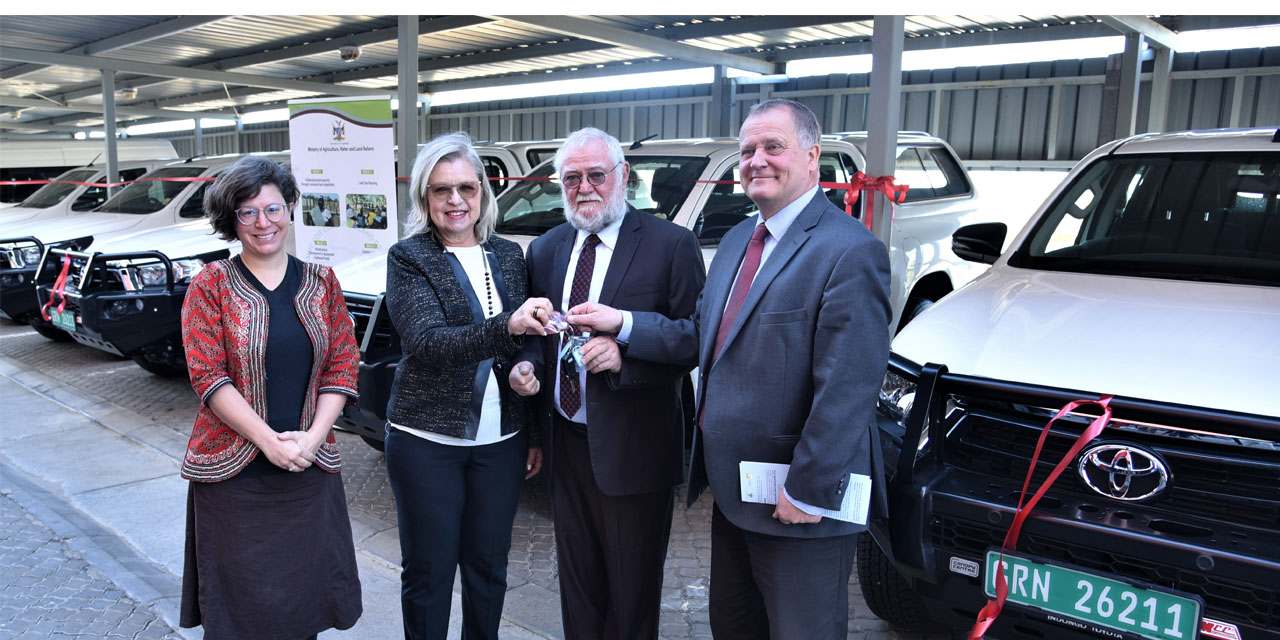Martin Endjala
The European Union has donated ten vehicles valued at N$6 549 963 million to the Ministry of Agriculture Water Land Reform.
The vehicles are part of the Programme for Communal Land Development (PCLD), supported jointly by KfW, the European Union and the Government of Namibia.
The PCLD’s overall objective is to improve the land-based livelihoods of rural communities through the development of communal land and their better integration into the mainstream economy.
“I am informed that these vehicles will be used to further support the mapping and verification of communal land rights in the different regions of Namibia, to fast-track security of tenure for more than 70 percent of subsistence farmers living on communal land to obtain their rights to land.”
These were the remarks of the EU Ambassador to Namibia, Sinikka Antila at the official handover of the vehicles to the ministry yesterday.
She noted that she is impressed by the amount of land rights registered and tenure security provided so far; the participatory land-use planning that has been done, whether at a local or regional level as well s the amount and type of farming infrastructures developed.
The Ambassador said that while good progress has been recorded on many of the results, currently, they are at 148 190 of Communal Land Registration of the final target of 245 000 which the programme intended to achieve.
This presents a backlog of 96 810 communal land parcels that still need to be registered and the progress on this front has been very slow in recent years.
The official handover of the Okatumba water pump station and the relevant infrastructures event in Omusati is slated for next month, stressing the need to create the necessary visibility to ensure that the work being done in the community is noticeable.
EU became part of this collaboration agreement in 2013, to which it contributed a total amount of EUR 17,2000,000 including the Delegation Agreement with GIZ which lapsed in September 2021.
“It has been 10 good long years since the signing of that agreement for this programme. Unfortunately, nothing lasts forever as they say, and at this juncture, let me announce that the EU support towards the Programme for Communal Land Development has terminated on 31 March 2023, said Antila”.
Meanwhile, the Minister of Agriculture Water Land Reform Carl Schlettwein stated that the programmes will be roll-out to regions such as Ohangwena, Omusati and parts of Northern Kunene region as well as in the two Kavango East and West regions including surrounding areas.
This roll-out to these communal areas is said to commercialise these areas, lamenting that communal plantation in these areas is vital in the agriculture sector as they will not only bring about food sufficient but also economic emancipation.
The donation of the new vehicles will enable the ministry to have a visible presence in these areas to address the needs which may arise in these areas.
Given the fact that activities in agriculture are time-bounding, transportation will play an essential role in ensuring farmers access market value to deliver their products promptly.
The link between communal areas and the market will bring benefits closer to them and their families.
Furthermore, Andreas Goetze, who is the Deputy Head of Mission at, the German Embassy and Member of the Programme Coordination Unit (PCU) of the Programme for Communal Land Development (PCLD) stressed that the program will not only help alleviate poverty but it will reduce rural-urban migration, which then leads to communal land productivity.
He reiterated that they remain confident in the programme and will continue to support the Namibian government.
In addition, since the inception of the programme, Executive Director Ndiyakupi Nghituwamata said that to date, the EU has spent a total of EUR 13.5 million, while the KFW spent a total of EUR 31.2 million, demonstrating their commitment towards uplifting livelihoods of the people of Namibia via agriculture.




